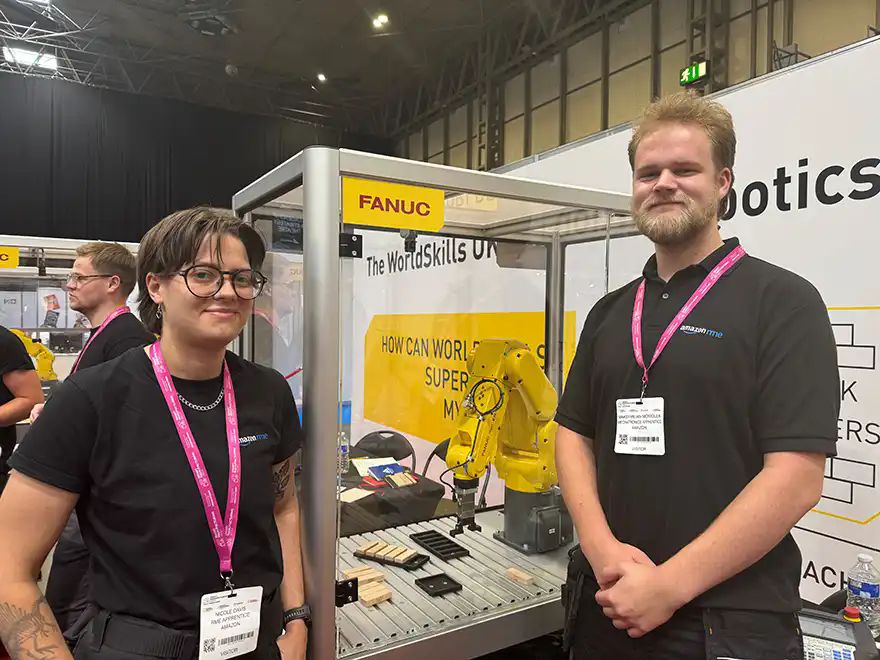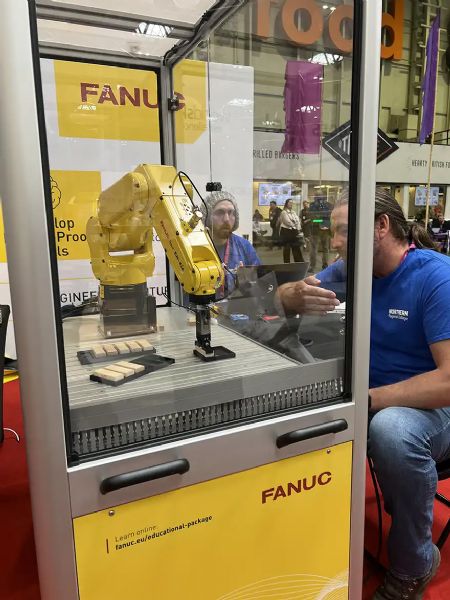 Nicole Davis and her partner Maksymilian Mosiolek, both Amazon apprenticesFanuc UK
Nicole Davis and her partner Maksymilian Mosiolek, both Amazon apprenticesFanuc UK has revealed the six teams of young people who have made it to the final of the
WorldSkills UK Industrial Robotics competition, taking place in Wales this November. Following two days of intense qualifiers at
Smart Factory Expo last month, teams from Northern Regional College in Ballymena, Northern Ireland and Bridgend College in Wales will now battle it out to be crowned the best young robotics programmers in the UK, and win the chance to represent Squad UK at the
WorldSkills international finals in Shanghai next year.
Ranging in age from 20 to 26, a total of 24 young people — including a record number of female competitors — competed live at the NEC in June in the qualifying rounds. According to Paul Coombes, Fanuc’s head of technical and one of the competition judges, the standard was higher than ever.
Mr Coombes explained: “This is now the fifth year that we have partnered with WorldSkills UK for the
Industrial Robotics competition. Fanuc provides virtual and hands-on training to the competitors, as well as a free copy of our Robot Simulation Software, to ensure they are well prepared for the challenge. This has clearly paid dividends as the level of expertise, knowledge and professionalism on display was extremely impressive. The judging panel had a tough time determining who to put through the finals, and all of the contestants should be extremely proud of their achievements.”

The teams who will now compete in the
WorldSkills UK Industrial Robotics competition final in November are: Dylan Jones and Joe Ashton from Bridgend College, Wales; Liam Warren and Ossian Thomas from Bridgend College, Wales; Luke Bodenham and Luke Evans from Bridgend College, Wales; Adam Duff and Eoin McAuley from Northern Regional College, Ballymena; Colin Kerr and Peter Vennard from Northern Regional College, Ballymena; and Ashley Harrow and Harry McKeown from Northern Regional College, Ballymena.
As part of the qualifying round, contestants were tasked with programming a robot to perform a pick and place application, similar to what industry might deploy. The teams were judged not just on their programming skills, accuracy and speed, but also on softer skills such as organisation, teamwork and documentation.
For Nicole Davis and her partner Maksymilian Mosiolek, both Amazon apprentices who competed in the qualifying stage, the competition gave them unrivalled hands-on experience with industrial robots, as well as helping them to develop wider skills that will prove useful in the workplace.
The importance of teamworkNicole said: “To help us prepare for the competition, we had a two-week crash course at the
Manufacturing Technology Centre in Coventry in how to use Fanuc LR Mate robots. This was our first experience of using industrial robots — we have absolutely loved it and learnt so much more about them as the contest progressed. Maksymilian and I are based at different sites, so we also had to work hard to collaborate as we practiced for the competition. We allocated each other specific targets, split tasks between us and monitored each other’s work. Alongside the technical skills we learnt, this proved really useful to us and underlined the importance of teamwork.”
Karla Kosch (pictured below) is the training manager for Robot Systems Integration for
WorldSkills UK. She agrees that strong communication and effective collaboration are key to success in the competition. She said: “You have to be able to work together as a team to succeed at WorldSkills, as one partner will be using the virtual Roboguide software to map out the robot’s path, while the other will be harnessing their physical robotics skills with the actual cell. During training, we encourage the competitors to swap roles to help them better understand what their partner needs from them.

“The skill level is increasing year-on-year and competitors’ abilities this year are higher than we have seen in the past. In part, this is due to the fact that college lecturers themselves now have more experience and expertise with robotics due to the training and support that Fanuc has provided as part of their partnership with
WorldSkills UK. It is also really encouraging to see more female competitors than ever before. For myself, as the only woman out of 18 representatives in the international Robot System Integrators network at
WorldSkills, greater female representation in robotics is something I wholeheartedly welcome.”
Whatever the outcome at the final round in November, it is clear that participation in the
WorldSkills UK Industrial Robotics competition is an overwhelmingly positive experience for all the young people that enter. Maksymilian said: “It was great to expose myself to a complete different area of engineering. I am keeping my options open regarding my future career, so the more skills I can acquire along the way, the better.”
Mr Coombes concluded: “There are so many benefits to taking part, not least the chance to learn from real automation experts how to programme actual robots. This will hopefully kickstart a love of robotics that could lead to a future career in the industry. But there are also softer skills to pick up, such as teamwork, record keeping and presenting; and of course, the chance to boost your CV and stand out from the crowd when applying for jobs and apprenticeships in the future.
WorldSkills UK really is a fantastic initiative, about which Fanuc is hugely passionate. We are now fully focused on helping the contestants prepare for the final in November.”